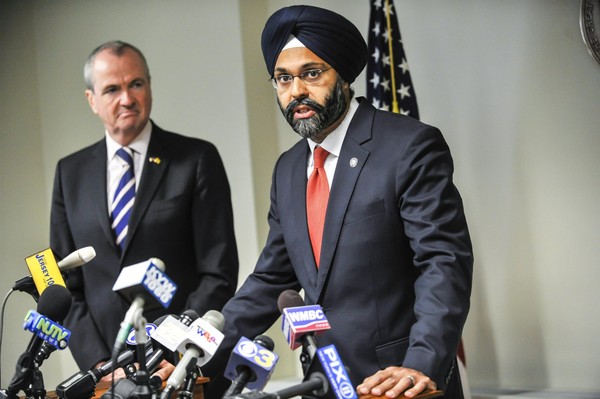In the final months of the Civil War, Abraham Lincoln asked Congress to pass an amendment to the Constitution that would ban slavery forever, a fight he eventually won.
But he lost the first vote in the House, in December of 1864. He was 13 votes short. What to do?
I thought of that moment when Gov. Phil Murphy was asked last week how he intended to round up the votes to legalize recreational marijuana. He’s still short, especially in the Senate, with a showdown set for March 25.
“I won’t get into if it’s five (votes short) or 10 or three or none,” Murphy said. “I’m not a big believer in transactional politics. I believe my role will be to say, ‘Listen, from my perspective as the chief executive of the state, let me tell you why I think this is an imperative.’”
In other words, our governor intends to win the vote on the merits, not by dirtying his hands with any crude back room deals. He wants to play a high-minded game of politics.
Lincoln saw things differently. Sure, he made the argument on the merits. He even visited the home of a reluctant Congressman whose brother had died in the fighting, begging him to get past his racial bitterness and support the amendment.
But it wasn’t enough. Even the Congressman he visited wouldn’t budge.
So, Honest Abe went low. He assembled a team of cutthroats and told them to do what it takes, to get transactional, in his name.
Many of the Congressmen who opposed Lincoln were Democrats who had lost their races in the 1864 vote and were serving their final months in office. They needed jobs, and Lincoln had plenty to offer, in return for their votes. One Congressman was even offered the ambassadorship to Denmark.
With those dirty hands, Lincoln steered America to higher ground, an irony noted at the time by Rep. Thaddeus Stevens, the famous abolitionist from Pennsylvania: “The greatest measure of the 19th century was passed by corruption, aided and abetted by the purest man in America.”
In Trenton, Murphy’s declaration of purity is not going down well.
“Give me a break, that’s just laughable,” says Sen. Declan O’Scanlon, R-Monmouth, the ranking Republican on the budget committee. “Right now, I’m a no vote. But I have about four things I want, and I’m more than willing to talk about it.”
Democrats who have worked for years to pass this legislation are frustrated that the governor is not helping more. Maybe democracy worked like that in Athens, when Socrates was around. But in Trenton today?
“It’s not the way the world works,” says Senate President Steve Sweeney, D-Gloucester. “This doesn’t get done without him pushing. The governor has tons of authority.”
True that. The governor appoints judges, prosecutors, and hundreds of other jobs. He can seduce one group of legislators by sending extra money to their towns, and punish others by cutting them off. When it comes to horse-trading, no one has more power.
“I’m constantly doing it,” Sweeney says. “I tell them, ‘I’ll post your bill for a vote, but I need your vote on this other bill.’ That’s real life.”
An example: Sen. Richard Codey, D-Essex, is one of Murphy’s few close allies in the Senate. The governor recently agreed to answer a key priority of Codey’s by supporting a $100 million subsidy for the horse racing industry, spread over five years.
But Codey plans to vote against the marijuana bill. So, I asked him if the governor called to ask for his support.
“No, he knew my position years ago, so there was no reason to call,” Codey said.
Really? Codey just got all he wanted and is now stiffing the governor in return. That’s not worth a phone call?
Granted, policy discussion should start on the merits. It makes for better policy.
To me, it seems brutal and insane that we lock up people for selling small quantities of weed, and it’s made intolerable by the glaring racial bias in enforcement. Codey says he thinks that can be fixed with separate legislation. I asked him how, and he had no ideas.
He said he’s concerned about kids smoking pot. “The instances of young adults, even 12 and 13-year-olds smoking marijuana is way up in Colorado,” he said.
I checked. It’s not true. The government of Colorado has sponsored extensive surveys to check that and has found no increase at all. It seems the kids have had access to pot all along.
Sen. Ron Rice, another ally of Murphy’s, opposes the bill as well, saying it would flood cities like Newark with crazed potheads. “This is plantation mentality,” he says. “This is not about social justice. This is a stick-up.”
Sen. Gerry Cardinale said at a recent hearing that brain scans show moderate use of marijuana can cause massive damage: “Is the tax trade-off going to be sufficient to have a lot of people walking around with major portions of their brains knocked out?” he asked. “I don’t think so.”
So, if Murphy plays this like Socrates, and puts his faith in rational thinking, he’s going to run into some roadblocks in Trenton. That’s where transactional politics comes in.
In the next two weeks, we’ll hear a lot of discussion on the merits of this bill. It can be improved. Critics are raising legitimate concerns over the difficulty marijuana convicts will face as they try to expunge their criminal records. It doesn’t do enough to open these new businesses to people of color from poor communities that were damaged the most by this destructive criminal prohibition. There is time for last-minute tweaking.
But if Murphy wants to get this done, he’ll need more than good arguments. He’s short about six votes in the Senate, and a handful in the Assembly. It’s time for him to use the full powers of his office – punishments or rewards — to get reluctant legislators on board.
That’s not immoral. It’s politics. Lincoln would approve.
Credit: nj.com













